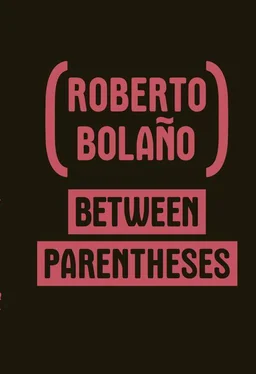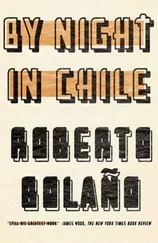Roberto Bolaño - Between Parentheses - Essays, Articles and Speeches, 1998-2003
Здесь есть возможность читать онлайн «Roberto Bolaño - Between Parentheses - Essays, Articles and Speeches, 1998-2003» весь текст электронной книги совершенно бесплатно (целиком полную версию без сокращений). В некоторых случаях можно слушать аудио, скачать через торрент в формате fb2 и присутствует краткое содержание. Год выпуска: 2011, Издательство: New Directions, Жанр: Публицистика, Критика, на английском языке. Описание произведения, (предисловие) а так же отзывы посетителей доступны на портале библиотеки ЛибКат.
- Название:Between Parentheses: Essays, Articles and Speeches, 1998-2003
- Автор:
- Издательство:New Directions
- Жанр:
- Год:2011
- ISBN:нет данных
- Рейтинг книги:4 / 5. Голосов: 1
-
Избранное:Добавить в избранное
- Отзывы:
-
Ваша оценка:
- 80
- 1
- 2
- 3
- 4
- 5
Between Parentheses: Essays, Articles and Speeches, 1998-2003: краткое содержание, описание и аннотация
Предлагаем к чтению аннотацию, описание, краткое содержание или предисловие (зависит от того, что написал сам автор книги «Between Parentheses: Essays, Articles and Speeches, 1998-2003»). Если вы не нашли необходимую информацию о книге — напишите в комментариях, мы постараемся отыскать её.
The Savage Detectives
Between Parenthese
Between Parentheses: Essays, Articles and Speeches, 1998-2003 — читать онлайн бесплатно полную книгу (весь текст) целиком
Ниже представлен текст книги, разбитый по страницам. Система сохранения места последней прочитанной страницы, позволяет с удобством читать онлайн бесплатно книгу «Between Parentheses: Essays, Articles and Speeches, 1998-2003», без необходимости каждый раз заново искать на чём Вы остановились. Поставьте закладку, и сможете в любой момент перейти на страницу, на которой закончили чтение.
Интервал:
Закладка:
The Private Life of a Novelist
My literary kitchen is often an empty room, without even a window. Of course, I’d like it if there were something in it, a lamp, some books, a faint scent of courage, but the truth is that there’s nothing.
And yet sometimes, when I succumb to irrepressible bouts of optimism (which lead, incidentally, to terrible allergy attacks), my literary kitchen becomes a medieval castle (with a kitchen) or a New York apartment (with a kitchen and incredible views) or a hut in the foothills of the mountains (without a kitchen, but with a campfire). In these circumstances, I do what everybody does: I lose my sense of proportion and imagine I’m immortal. I don’t mean immortal in literary terms, because you’d have to be an idiot to believe that, but literally immortal, like dogs and children and good citizens who have yet to fall ill. Fortunately or unfortunately, every bout of optimism has a beginning and an end. If it didn’t, it would become a political calling. Or a religious declaration. And from there it’s just a short step to burying books (I won’t say “burning books” because that would be an exaggeration). In my case, at least, the truth is that these bouts of optimism come to an end, and with them goes the literary kitchen, which vanishes into thin air, and all that’s left is my convalescent self and a faint smell of dirty pots, unscraped plates, spoiled sauces.
The literary kitchen, I tell myself sometimes, is ruled by taste, by which I mean that it’s a domain in which memory and ethics (or moral values, if I can call them that) play a game whose rules I don’t know. Talent and excellence watch the game, mesmerized, but they don’t take part. Daring and bravery do take part, but only at certain moments, which is to say not often. Suffering takes part, pain takes part, death takes part, but on the condition that they don’t take the game seriously. They’re just playing to be polite.
Much more important than the literary kitchen is the literary library (if you’ll excuse the redundancy). A library is much more comfortable than a kitchen. A library is like a church, whereas a kitchen gradually begins to resemble a morgue. Reading, said Gil de Biedma, is more natural than writing. I would add (redundancy aside) that it’s also much healthier, no matter what the ophthalmologists say. In fact, literature is a long struggle from redundancy to redundancy, until the final redundancy.
If I had to choose a literary kitchen to move into for a week, I would choose one that belonged to a woman writer, so long as that writer wasn’t Chilean. I would live very happily in Silvina Ocampo’s kitchen, or Alexandra Pizarnik’s, or in the kitchen of the novelist and Mexican poet Carmen Boullosa, or of Simone de Beauvoir. Among other things, because they’re cleaner.
Some nights I dream about my literary kitchen. It’s huge, like three soccer stadiums, with vaulted ceilings and endlessly long tables at which all the living beings on earth crowd together, the extinct and those soon to be extinct; it’s unevenly lit, in some places with anti-aircraft searchlights and in others with torches, and naturally there are plenty of dark sections where all that can be glimpsed are yearning or menacing shadows, and big screens on which, out of the corner of your eye, you can see silent films or slideshows, and in the dream or nightmare I stroll around my literary kitchen and occasionally I fire up a stove and make myself a fried egg, sometimes even a piece of toast. And then I wake up feeling utterly exhausted.
I don’t know what you should do in a literary kitchen, but I do know what you shouldn’t do. You shouldn’t plagiarize. Plagiarists deserve to be hanged in the public square. Swift said so, and Swift, as everybody knows, was always right.
Just so we’re clear on this point: no one should plagiarize, unless he wants to be hanged in the public square. Although today plagiarists aren’t hanged. In fact, they’re given scholarships, prizes, public office, and if very lucky, they become bestsellers and opinion makers. What a strange and ugly term: opinion makers. I suppose it means the same thing as shepherd, or spiritual guide of slaves, or poet laureate, or father of the nation, or mother of the nation, or uncle-by-marriage of the nation.
In my ideal literary kitchen there lives a warrior, whom some voices (disembodied voices, voices that cast no shadow) call a writer. This warrior is always fighting. He knows that in the end, no matter what he does, he’ll be defeated. But he still roams the literary kitchen, which is built of cement, and faces his opponent without begging for mercy or granting it.
Advice on the Art of Writing Short Stories
Now that I’m forty-four, I have some advice to offer on the art of writing short stories. 1) Never tackle stories one by one. Really, if you tackle them one by one you could be writing the same story until the day you die. 2) It’s best to write stories three at a time, or five at a time. If you’ve got the energy, write them nine at a time, or fifteen at a time. 3) Careful: the temptation to write them in twos is as dangerous as deciding to write them one by one — it conceals the rather sticky game of mirrors in love, which yields melancholic reflections. 4) You must read Quiroga, you must read Felisberto Hernández, you must read Borges. You must read Rulfo and Monterroso. A short-story writer with any respect at all for his work will never read Cela or Umbral. He’ll read Cortázar and Bioy Casares, but by no means Cela and Umbral. 5) Let me repeat, in case it’s not clear: Cela and Umbral must be avoided like the plague. 6) A short-story writer must be brave. Sad to say, but it’s true. 7) Short-story writers often boast of having read Petrus Borel. In fact, short-story writers are notorious imitators of Petrus Borel. Big mistake: they should imitate the way Petrus Borel dresses! But the truth is they hardly know anything about Petrus Borel! Or about Gautier, or Nerval! 8) Let’s make a deal. Read Petrus Borel, dress like Petrus Borel, but also read Jules Renard and Marcel Schwob, especially Marcel Schwob, and after that Alfonso Reyes, and then Borges. 9) The honest truth is that if we read Edgar Allan Poe that would be more than enough. 10) Consider that ninth point. Consider and reflect. It’s not too late. You must consider point number nine. If possible: on your knees. 11) Highly recommended books and authors: On the Sublime , by Longinus; the sonnets of brave, ill-fated Philip Sidney, whose biographer was Lord Brooke; the Spoon River Anthology , by Edgar Lee Masters; Suicidios ejemplares [Exemplary Suicides], by Enrique Vila-Matas; and While the Women Are Sleeping , by Javier Marías. 12) Read these books and also read Chekhov and Raymond Carver. One of the two of them is the best short-story writer this century has produced.
About The Savage Detectives
There are some nice things — not many — about finishing a novel, and one of them is beginning to forget it, remembering a dream or a nightmare that gradually fades so that we can face new books, new days, without the constant reminder of what in all likelihood we could have done better and didn’t. Kafka, this century’s best writer, showed the way when he asked a friend to burn all his work. He assigned the task to Brod, on the one hand, and also to Dora, his lover. Brod was a writer and he didn’t keep his promise. Dora was less educated and she may have loved Kafka more, and one presumes that she carried out her lover’s request to the letter. All writers, especially on the flat day, which is the day after, or what we vainly believe is the day after, have two devils or angels inside called Brod and Dora. One is always bigger than the other. Usually Brod is bigger or more powerful than Dora. Not in my case. Dora is considerably bigger than Brod, and Dora helps me forget what I’ve written so that I can write something new, with no pangs of shame or regret. So The Savage Detectives is more or less forgotten. I can only venture a few thoughts about it. On the one hand I think I see it as a response, one of many, to Huckleberry Finn ; the Mississippi of The Savage Detectives is the flow of voices in the second part of the novel. It’s also the more or less faithful transcription of a segment of the life of the Mexican poet Mario Santiago, whose friend I was lucky enough to be. In this sense the novel tries to reflect a kind of generational defeat and also the happiness of a generation, a happiness that at times delineated courage and the limits of courage. To say that I’m permanently indebted to the work of Borges and Cortázar is obvious. I believe there are as many ways to read my novel as there are voices in it. It can be read as a deathbed lament. It can also be read as a game.
Читать дальшеИнтервал:
Закладка:
Похожие книги на «Between Parentheses: Essays, Articles and Speeches, 1998-2003»
Представляем Вашему вниманию похожие книги на «Between Parentheses: Essays, Articles and Speeches, 1998-2003» списком для выбора. Мы отобрали схожую по названию и смыслу литературу в надежде предоставить читателям больше вариантов отыскать новые, интересные, ещё непрочитанные произведения.
Обсуждение, отзывы о книге «Between Parentheses: Essays, Articles and Speeches, 1998-2003» и просто собственные мнения читателей. Оставьте ваши комментарии, напишите, что Вы думаете о произведении, его смысле или главных героях. Укажите что конкретно понравилось, а что нет, и почему Вы так считаете.












